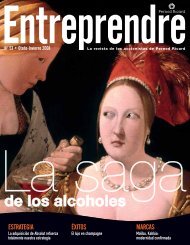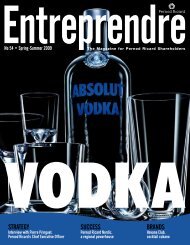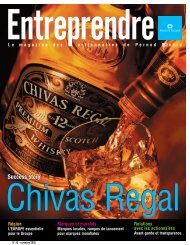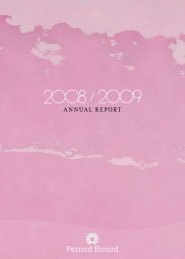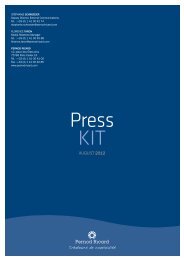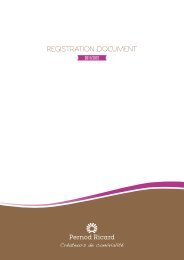Registration Document - Pernod Ricard
Registration Document - Pernod Ricard
Registration Document - Pernod Ricard
You also want an ePaper? Increase the reach of your titles
YUMPU automatically turns print PDFs into web optimized ePapers that Google loves.
◆<br />
◆<br />
◆<br />
CORPORATE GOVERNANCE AND INTERNAL CONTROL 2<br />
Report of the Chairman of the Board of Directors on the conditions governing the preparation<br />
and organisation of the work performed by the Board<br />
f member of the Board of another company in which the Company<br />
is a D irector or in which an employee or D irector of the Company<br />
holds the office of Director (currently or in the past five years);<br />
is a major client, supplier or banker of the Company or its Group or<br />
for which the Company or its Group represents a significant share<br />
of its business;<br />
has close family ties with a member of the Board;<br />
has been a company auditor at any point in the past five years:<br />
◆ has been a member of the company’s Board of Directors for more<br />
than twelve years;<br />
◆ is a major or majority shareholder in the Company or P arent<br />
C ompany controlling the Company. If this shareholder owns more<br />
than 10% of the share capital or voting rights in the Company, the<br />
Appointments Committee and Board will systematically review its<br />
independence in consideration of the Company’s share ownership<br />
structure and the potential conflict of interest.<br />
However, the AFEP-MEDEF recommendations expressly indicate that<br />
the Board may rule that a given criterion is irrelevant or that it requires<br />
interpretation that is specific to the Company. On this basis, despite<br />
the AFEP-MEDEF Code recommendation that a D irector should lose<br />
his/her quality of independence at the end of the term in progress<br />
when his/her total length of service exceeds 12 years, this criterion<br />
was not applied for one D irector of the Company due to his experience<br />
and authority, which confirm said D irector’s independence.<br />
In compliance with these criteria, the Board of Directors is comprised<br />
of 14 members, including 7 independent D irectors.<br />
On 2 September 2009, the Board of Directors, following the advice of<br />
the Appointments Committee, decided to propose the appointment of<br />
three new D irectors at the Shareholders’ Meeting on 2 November 2009:<br />
Mr. Gérald Frère, Mr. Michel Chambaud and Mr. Anders Narvinger.<br />
The Appointments Committee reviewed these three candidates and<br />
determined that Messrs Gérald Frère, Michel Chambaud and Anders<br />
Narvinger meet the independence criteria applied by the Company.<br />
Code of Conduct of Directors<br />
Article 4 of the Internal Regulations and Article 17 of the bylaws<br />
stipulate the rules of conduct that apply to Directors and their<br />
permanent representatives. Each Director acknowledges his/her<br />
awareness of these obligations prior to accepting the office.<br />
Operation and activity<br />
The method of operation of the Board of Directors is provided for by<br />
the legal and regulatory provisions, by the bylaws and by Internal<br />
Regulations (1) adopted by the Board of Directors at its meeting on<br />
17 December 2002, reviewed and supplemented during the Board<br />
sessions of 18 June, 23 July 2008 and 22 July 2009. The Internal<br />
Regulations of the Board of Directors specify the rules and methods<br />
of operation of the Board, in addition to the legal regulatory and<br />
statutory aspects. In particular, they remind Directors of the rules on<br />
diligence, confidentiality and disclosure of conflicts of interest. They<br />
confirm the various rules in force with regard to the conditions for<br />
trading in the Company’s shares on the stock market, the obligations<br />
to make declarations and publication requirements relating thereto.<br />
Assessment of the Board of Directors<br />
On a regular basis of at least once a year, the Board of Directors<br />
includes on its agenda a discussion on its operation, in which it:<br />
◆ reviews its composition, operation and structure;<br />
◆ checks that the major issues have been adequately prepared and<br />
debated.<br />
Furthermore, at least once every three years, it performs a formal<br />
review of its work or has one carried out.<br />
In application of the C orporate G overnance recommendations and<br />
its Internal Regulations, the Board of Directors began a new in-depth<br />
analysis of the terms of its membership, its structure and its operation<br />
in 2009. The last formal review was performed in 2006. The purpose<br />
of the 2009 review was to assess the improvements made and define<br />
those that could be implemented to enhance efficiency.<br />
The review was in the form of a self-assessment coordinated by the<br />
secretary of the Board with the assistance of an external consultant<br />
who was available to the Directors for any questions or further<br />
information.<br />
Overall, the assessment was satisfactory in terms of the Board’s<br />
operation, and the Board believes that the concrete measures taken<br />
since the previous review have improved efficiency.<br />
As part of its constructive approach, which is critical by definition,<br />
the Directors expressed a number of recommendations:<br />
◆ given the more challenging economic and market climate, they<br />
requested more detailed and more up-to-date information on the<br />
assessment of the main research companies as regards value and<br />
sector;<br />
◆ while it considers that it has a good understanding of the C ompany’s<br />
main risks, they requested a more formal approach in identifying,<br />
mapping and prioritising risks;<br />
◆ at Board meetings, more focus should be given to examining the<br />
work of the Committees, as Directors who are not members of<br />
Committees expressed a desire for greater involvement.<br />
Board meetings<br />
It is the responsibility of the Chairman to call Board meetings either<br />
at regular intervals, or at times that he considers appropriate. In order<br />
to enable the Board to review and discuss in detail the matters falling<br />
within its area of responsibility, the Internal Regulations provide that<br />
Board meetings must be held at least six times a year. In particular, the<br />
Chairman of the Board of Directors ensures that Board of Directors<br />
meetings are held to close the interim financial statements as well as<br />
the annual financial statements and convene a Shareholders Meeting<br />
for the purpose of approving the financial statements.<br />
(1) The Internal Regulations can be consulted on the Company’s website (www.pernod-ricard.com) and can be amended at any time by the Board of Directors.<br />
I REFERENCE DOCUMENT 2008/2009 I PERNOD RICARD 27




